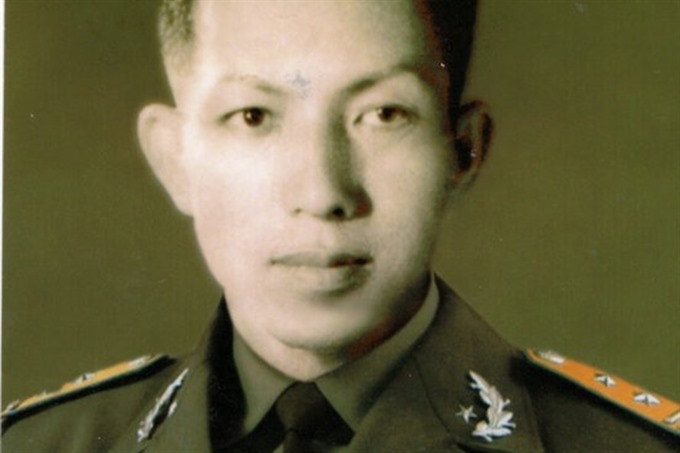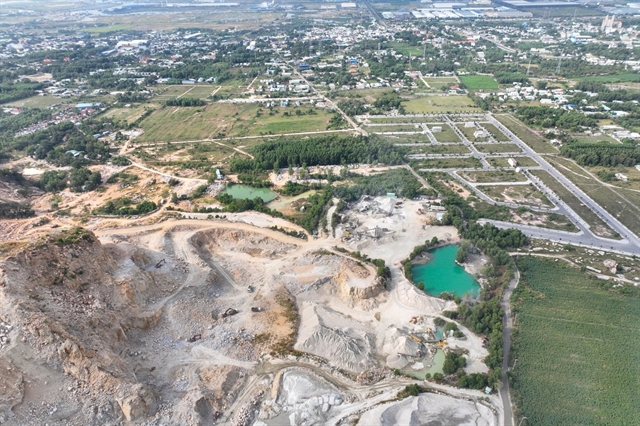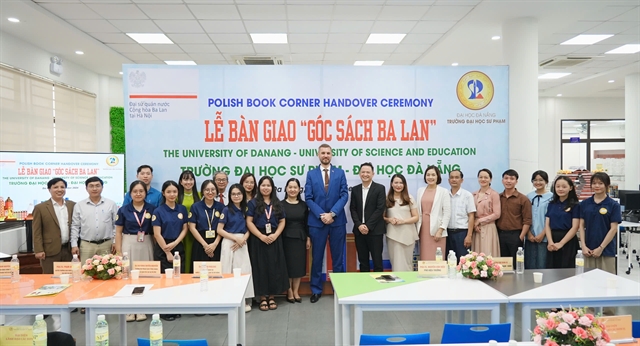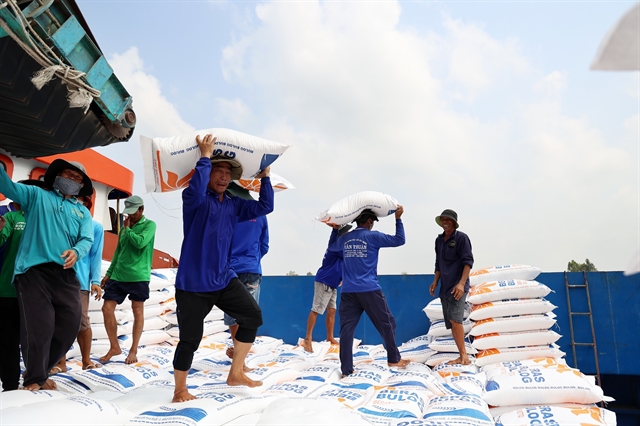

Đặng Văn Việt left a comfortable life to join the revolution against French colonials. He has now lived a whole century and done many things.
 |
| This photo was taken when Đặng Văn Việt was serving in the Vietnamese People’s Army. File Photo |
Đặng Văn Việt left a comfortable life to join the revolution against French colonials.
He has now lived a whole century and done many things.
During this time he was a brave soldier, doing courageous things.
Even his enemies respected him.
by Huyên Nguyễn
Having reached the milestone age of 100, Đặng Văn Việt still impresses with his gentle voice and vivid memories. His face is full or pride recalling the years he spent fighting the resistance war against French colonialists.
Việt left his prestigious family background to follow the revolution. He was born in Nho Lâm Village in Diễn Châu District in the central province of Nghệ An in 1920. Both of his parents’ families were of noble descent – his maternal grandfather was Cao Xuân Dục, a minister of education and the author of many historical and geographical works; while his paternal grandfather was Đặng Văn Thụy, who managed the Temple of Literature, the first university in Việt Nam. His father was Đặng Văn Hướng who was a minister during the reign of King Bảo Đại (1926-1955).
Việt attended the Huế High School for the Gifted, and after graduation he studied at the Indochina School of Medicine (École de Médecine de l’Indochine) in Hà Nội. In his third year, after the Japanese army coup d’état against the French led to the closure of the school, he joined the Viet Nam Independence League in 1945.
That same year, together with another comrade, he was assigned to lower the flag of the Nguyễn Dynasty (1802-1945) and hang the Việt Minh’s red flag with a gold star in the centre of Huế on August 21, 1945.
From July 1947, Việt’s military career moved to Highway 4, the most dangerous route in the battle zones in Cao Bằng, Bắc Kạn and Lạng Sơn and the border between Việt Nam and China.
He became the commander of Regiment 174 at the age of 27. Over the course of three years, he organised ambushes and attacked enemy posts along Highway 4 until victory was achieved in October 1950.
Regiment 174, under his direction, controlled the highway and won many resounding victories that frightened the French and earned Việt the alias the "Blue Tiger of Highway 4”.
As one of the first regiment chiefs of the Viet Nam People’s Army, together with a top-ranking general, Lê Trọng Tấn, Việt posed a big question for the enemy.
Former French Colonel Charles de Pirey later wrote a letter to Việt, saying: “We were taken by surprise to discover later that the most dangerous enemy to us, the person who upset us most on Highway 4, was a 30-year-old man… To us, Đặng Văn Việt was an ingenious, dangerous and uncompromising rival but also a person who abided by international laws on prisoners of war...”
Losses
"I survived many battles and difficulties but never felt fear," Việt recalled.
Joining the revolution, the first person Việt lost was his lover.
His second loss was caused by the land reform programme in which the land owned by landlords were confiscated and redistributed to poor and landless peasants while the landlords and reactionaries were executed from 1953 to 1956 in northern Việt Nam. Việt’s family were mandarins for the Nguyễn Dynasty, so his father was tied in front of the communal house, stripped of all possessions and land and died about two years later as his family had no money to pay for medicine.
Việt’s life has been full of ups and downs. After finishing his military career, he worked for the Ministry of Construction and Ministry of Fisheries. In his new position as a vice director, he still set an example as an enduring striver. At the age of 40, he attended the Ha Noi University of Science and Technology and graduated after five years.
In 1980, he retired and moved to a small apartment, growing fruit trees to make money for his family.
With his rich cultural and practical knowledge, Việt has written a number of best-selling books, including his memoir entitled Người Lính Già Đặng Văn Việt -- Chiến Sĩ Đường Số 4 Anh Hùng (The Old Soldier Đặng Văn Việt -- The Soldier of Heroic Highway 4) that has been translated into French, Đường Số 4 Rực Lửa (Flaming Hightway 4), and his most recent book Người Lính Già Kể Chuyện Dân Tộc Việt Nam 4,000 Năm Chống Xâm Lược (The Old Soldier Tells Stories of Vietnamese People’s 4,000 Year Fighting Against Invasions).
A hero with no title
Summerising his military career, Việt recalled that he commanded 130 battles and won 116 of them.
His highest military rank was lieutenant colonel and he has never been awarded the title of Viet Nam People’s Army’s Hero.
“If I’ve been given the title, I think that Việt should have been awarded it five or ten times,” said hero La Văn Cầu.
Late General Võ Nguyên Giáp also said: “There is no question about Việt’s talent and morality: creative in the military, steadfast in politics and a productive literary capacity.”
“Highway 4 is like a medal attached to Việt’s chest, confirming that he was good at fighting the enemy and minimising Vietnamese force’s losses. He set an example of a noble spirit that moved us to the bottom of our hearts,” Major General Cao Pha, who hung the Việt Minh’s flag in Huế with Việt, commented on his comrade.
Though the reason why Việt has yet to receive any honourable title has not been clarified, people can still see the high spirit of the “Blue Tiger of Highway 4”.
"Some may question why I don’t feel discontent," he said. “I do not feel I was disadvantaged because I could travel by car when I was still in my mother’s belly, live in a big house, study at an international school and play with foreign friends while growing up.”
“My biggest aspiration was to drive off the colonialists and regain independence for the nation. After joining the revolutionary front, I was determined to fight, but I couldn’t have made it without President Hồ Chí Minh and the Communist Party," he said.
“There would be both gains and losses, happiness and sadness, but I have gained more than I lost because I have had the whole nation and people with me. Like other Vietnamese, I sacrificed the small to gain the big things.
“My greatest happiness is being a general in the people’s hearts and the son of all kins, being honoured and recognised by the masses.” VNS
GLOSSARY
Having reached the milestone age of 100, Đặng Văn Việt still impresses with his gentle voice and vivid memories.
If you impress someone, they think good of you and what you can do.
Vivid means lively.
Việt left his prestigious family background to follow the revolution.
Prestigious means very smart.
Both of his parents’ families were of noble descent – his maternal grandfather was Cao Xuân Dục, a minister of education and the author of many historical and geographical works; while his paternal grandfather was Đặng Văn Thụy, who managed the Temple of Literature, the first university in Việt Nam.
If you are of noble descent, your parents, grandparents, great grandparents and so on, were rich and powerful people.
Your maternal grandfather is your mother’s father.
Your paternal grandfather is your father’s father.
In his third year, after the Japanese army coup d’état against the French led to the closure of the school, he joined the Viet Nam Independence League in 1945.
When a coup d’etat happens, army officers take over the government.
Over the course of three years, he organised ambushes and attacked enemy posts along Highway 4 until victory was achieved in October 1950.
An ambush is an attack that involves surprising the enemy from a hiding place.
Regiment 174, under his direction, controlled the highway and won many resounding victories that frightened the French and earned Việt the alias the "Blue Tiger of Highway 4”.
Resounding means massive.
An alias is another name for someone, or in this case, something.
To us, Đặng Văn Việt was an ingenious, dangerous and uncompromising rival but also a person who abided by international laws on prisoners of war...”
Ingenious means original.
Abided by means “obeyed”.
His second loss was caused by the land reform programme in which the land owned by landlords were confiscated and redistributed to poor and landless peasants while the landlords and reactionaries were executed from 1953 to 1956 in northern Việt Nam.
Reform means change.
Landlords are property owners.
When land is confiscated it is taken away by people in authority.
Reactionaries are people who do not want things to change.
When people are executed they are put to death.
In his new position as a vice director, he still set an example as an enduring striver.
A striver is someone who never stops trying to achieve something. An enduring striver is one who does so while suffering.
In 1980, he retired and moved to a small apartment, growing fruit trees to make money for his family.
When people retire, they stop working – usually because of their age.
Summerising his military career, Việt recalled that he commanded 130 battles and won 116 of them.
Summerising his military career means talking about, or writing about it without taking too long and focussing on the important details.
Late General Võ Nguyên Giáp also said: “There is no question about Việt’s talent and morality: creative in the military, steadfast in politics and a productive literary capacity.”
Talent is natural skill.
Morality is a sense of doing what is correct.
Someone’s literary capacity is their being able to read, write and have lots of knowledge.
Though the reason why Việt has yet to receive any honourable title has not been clarified, people can still see the high spirit of the “Blue Tiger of Highway 4”.
Clarified means made clear and understandable.
"Some may question why I don’t feel discontent," he said.
Discontent means unhappiness.
“My biggest aspiration was to drive off the colonialists and regain independence for the nation.
An aspiration is a hope.
Colonialists are people who come to a country from another country and settle there while their old country rules.
Like other Vietnamese, I sacrificed the small to gain the big things.
To sacrifice something means to give it up for a bigger cause.
“My greatest happiness is being a general in the people’s hearts and the son of all kins, being honoured and recognised by the masses.
Kins are people who are close to you, like family and good friends.
WORKSHEET
Find words that mean the following in the Word Search:
o | i | m | o | y | r | u | f | i | v | e | d |
r | t | b | s | e | n | i | g | r | t | e | l |
o | p | h | t | p | d | y | t | l | u | y | r |
o | a | m | o | a | n | t | a | e | n | i | a |
k | i | v | n | o | v | n | u | t | r | l | t |
i | e | i | f | l | a | r | g | t | e | n | n |
e | h | a | e | n | r | i | u | e | e | b | y |
c | o | m | m | a | n | d | e | r | a | c | m |
s | t | b | a | c | h | i | t | g | n | d | m |
b | r | v | e | t | e | r | a | n | s | a | r |
© Duncan Guy/Learn the News/ Viet Nam News 2018
1. Commander; 2. China; 3. Letter; 4. Five; 5. Fruit.









